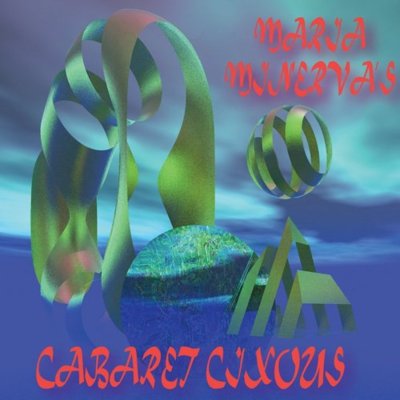Estonia is a little country in northeastern Europe that just so happens to sit at a variety of crossroads: its religion is a mix of western Protestantism and eastern Orthodoxy; its culture, while largely indigenous, also incorporates elements of both the Baltic region (of which it is a part) and Scandinavia (from which it’s separated by nothing but the Baltic Sea); historically, it has been part of the Holy Roman Empire, the Swedish Empire of the 16th and 17th centuries, and most recently the Soviet Union. So despite retaining their own language and culture through the many transfers of power during its history, Estonians have become veterans at the multiculturalism game.
Perhaps this helps to explain Maria Minerva’s particular brand of bedroom disco, a seemingly effortless blend of danceable beats and lo-fi electronica that plays with both psychedelia and new age. Her two prior releases — the hyperactive Noble Savage 12” for 100% Silk and the hazier Tallinn at Dawn cassette for Not Not Fun, both released earlier this year — explored different aspects of this lo-fi “synthwave” sound and revealed an artist with a refreshing flair for variety. Her debut LP, Cabaret Cixous, continues her tradition of layering different genres on top of each other, creating dense and atmospheric songs that capitalize on her strengths — a confident Lolita sensibility, breathless vocals that pull double duty as both melody carriers and ambient textures, a knack for memorable pop hooks smothered in Not Not Fun’s trademark tape-warped sound — while never shying away from trying on new sounds for size.
Opening track “These Days” finds a funky, early-90s R&B bassline anchoring sci-fi sound effects and enough synth pads to soundtrack a month’s worth of planetarium presentations, while “Pirate’s Tale” shoves calm synth lines in front of a hard-driving industrial rhythm that sounds like a slowed-down C & C Music Factory outtake. On both tracks, Minerva’s voice swirls and echoes as though she’d laid down the vocal tracks in some hash-soaked Portland loft. “Luvcool,” meanwhile, is at once arctic and tropical thanks to a series of stark synth notes that float like ice floes through a sea of tribal percussion. “Laulan Paikse Kaes” is perhaps the strangest beast on the album, taking that familiar mid-90s southern-fried keyboard squeal (think “Gin & Juice”) and letting it rub shoulders with a mechanical beat that’s miles away from the stoner vibes of Snoop’s earliest recordings. Remarkably, the results of all this alchemy aren’t abrasive or awkward; nor do they rely on the vicarious nostalgia that labels like Not Not Fun and Olde English Spelling Bee have (perhaps unwittingly) introduced into the contemporary electronic lexicon. There’s even an ABBA cover here, though you wouldn’t realize it if you weren’t familiar with the original. Needless to say, Minerva’s “Honey Honey” is a decidedly darker and woozier affair than its glitzy, string-laden Swedish forebear.
I know, I know — another white girl with a laptop, a bedroom, and what seems like the kind of post-hip detachment that lends itself all too well to the genre tourism of the cassette underground (“hazy sun-drenched new wave folktronica,” etc.). But to put it bluntly, Minerva is likeable and doesn’t appear to take herself too seriously. Tallinn at Dawn ended with the “Ten in the Bed”-aping “10 Little Rock Chix Listening To Neu!” while Cabaret includes the aforementioned “Laulan Paikse Kaes” (Estonian for “I sing in the sun”), the aforementioned ABBA cover, and most amusingly, a brief track entitled “Favourite Song (Italo Interlude)” which pays tribute to her unnamed “favourite song” in a way that reminds me of Tenacious D’s “Tribute,” on which Jack Black and Kyle Gass excitedly remember “the greatest song in the world” without actually playing that song, instead cheekily opting to record a simple “tribute.” The album ends with “Ruff Trade,” which rides a marching-band beat past ominously vague lyrics about how “love is free, well at least it’s supposed to be,” and a chorus on which she encourages her lover to “put me on the floor, push me against the door, bang me through the wall—this is rough trade.” It’s a strange, slightly unsettling, and highly catchy finale that emphasizes Minerva’s coquettish appeal, a wide-eyed visage that belies the aggressive personality lurking within.
Indeed, feminist aggression — or at least, a refusal to remain passive — is another theme of Cabaret Cixous. The album’s title alludes to French feminist scholar Hélène Cixous, while “Spiral” begins with an excerpt from an essay written by another modern-day feminist theorist, Avital Ronell (who, speaking of versatility, teaches philosophy at the European Graduate School in Switzerland as well as German, English, and comparative literature at New York University). Maria Minerva makes music that is certainly nostalgic and hazy and half-remembered; most of the usual buzzwords apply here. But she stands out because she stands on her own; she takes all these references and styles and genre signifiers, throws them in a spaced-out blender, and then confidently serves the resulting mixture to willing listeners. As the feminist references on Cabaret Cixous show, she’s confident her own abilities as a songwriter and producer. Perhaps this is truly her greatest strength: Minerva may be another bedroom pop artist, but she’s not content to hide beneath her sheets and relive the simpler days of her childhood. In fact, I’d say that with this album, she’s stepped out of her bedroom and into the eclectic, dimly-lit electronic underground. Her heritage is Estonian, but her music is for any open-minded fan of the eclectic and the self-assured.

